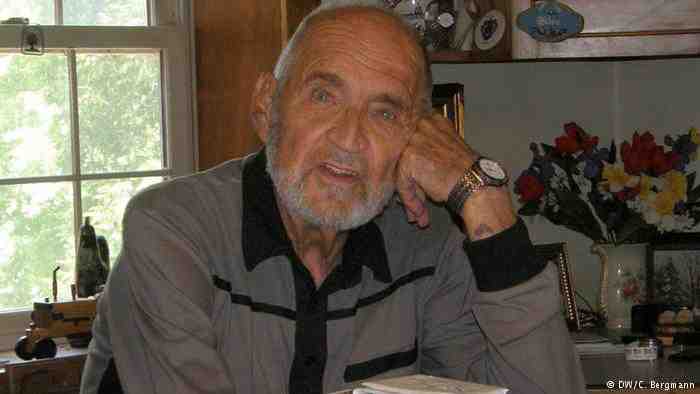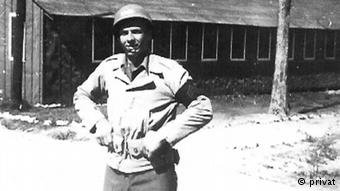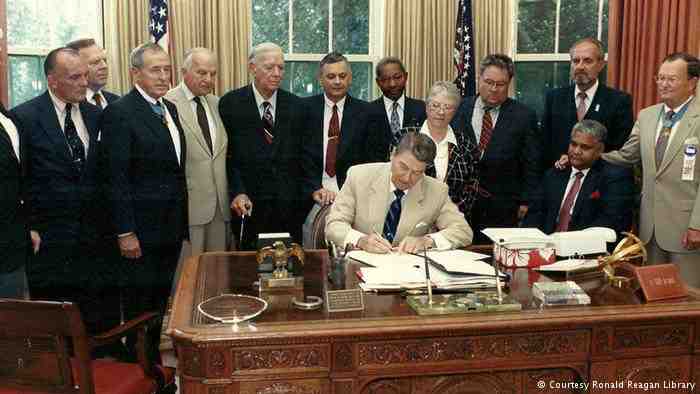http://www.dw.de/a-us-veteran-remembers-the-korean-war/a-16967508
United States
A US veteran remembers the Korean War

US veteran William Weber was badly
wounded in the Korea War. He lost an arm and a leg. The retired colonel
can deal with that, but other memories have kept their hold over the 87-year-old.
"You have a sense of sorrow that
you didn't get an opportunity to do what you know you could have done,
had weather not intervened," William E. Weber says. The retired US-Army
colonel was a member of the 187th Airborne Regimental Combat Team dropped
behind enemy lines in North Korea on October 20, 1950. Several thousand
soldiers landed near Sukchon and Sunchon, about 50 kilometers north of
Pyonyang. The plan was to prevent the North Korean army from retreating
and the government from fleeing - but it failed.
Due to bad weather, the jump was
delayed by several hours, which gave the North Koreans enough time to disappear,
Weber remembers. The soldiers arrived too late for the more than 200 UN
prisoners of war, on their way in a train transport to the North. "When
it became apparent we were going to be able to rescue the prisoners, they
massacred them, slaughtered all of them, in the tunnel," Weber told DW
- adding those are the imponderabilities of war that are not worth losing
sleep over.
Professional soldier

Weber is proud to have fought in Korea,
but he regrets
some of the things he did there
Born in Chicago, William Weber grew
up in Milwaukee. At the age of 17, during World War Two, in February 1943,
he enlisted with the US Army. In January 1945, he was deployed to the Pacific,
first to the Philippines, then to Okinawa and Yokohama to monitor the Japanese
capitulation. His grades were good, and since there was a lack of senior
officers, Weber had the opportunity to take up an officer career.
In September 1950, he was wounded
in Korea for the first time, shot in the shoulder. No big deal, Weber says.
"Those kinds of wounds don't put you down; they're basically an inconvenience
unless they hit a nerve or an artery. One that goes in and out, it's just
not a hell of a lot different than if you stick a needle in your finger,
it's just a bigger hole, that's all."
But even a professional soldier
like William Weber doesn't take everything as lightly as a missed chance
because of inclement weather or a simple shot in the shoulder.
'What we had to do was terrible'
That December, Weber's regiment
secured the retreat of the Eighth US Army to the 38th Parallel. On the
Yalu River, the Americans were defeated by the Chinese, who had in the
meantime entered the war. The retreat took the army through rural areas,
past villages at the foot of mountains. They had orders to make sure the
Chinese troops on their heels would not find food or shelter. "We were
forced to destroy the livelihood of these innocent people, we burned their
homes and we burned their stores - they had already harvested their rice
and wheat," Weber says, tears in his eyes as his voice falters. "We destroyed
their ability to live. They died, they starved, they were uprooted."

Weber (2nd from right) was there
when Ronald Reagan appointed
the committee for the Korea Memorial
"It was war, but what we did to
those people because we had to was terrible," Weber says, adding that he
and his comrades return to those events every time they meet. "It wasn't
our fault. But those of us who did that have lived with it ever since."
Source:
http://www.dw.de/a-us-veteran-remembers-the-korean-war/a-16967508
|